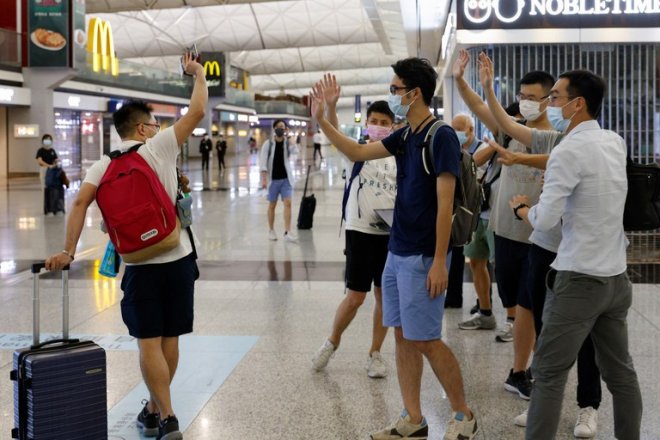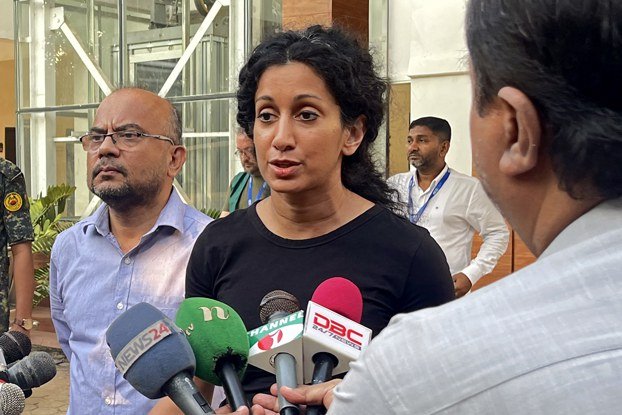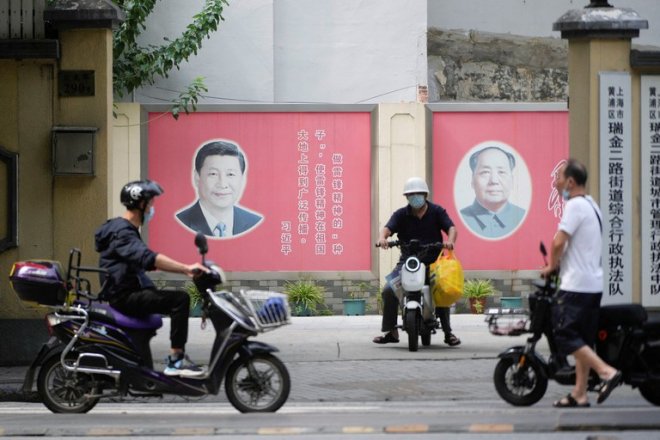INTERVIEW: 'There will always be people who wake up and realize what's happening'
Social media accounts run by Chinese people living overseas sometimes function as informal news services or safe spaces for political discussions for people still living in China, whose freedom of expression is seriously curtailed by the government’s censorship of online speech. These "anti-bandit" accounts -- slang for opposition to Beijing -- on platforms like Twitter or Instagram are providing a new focus for young, politically aware Chinese nationals and a counterweight to the power of the Chinese Communist Party’s propaganda machine. Four social media influencers spoke to RFA Mandarin and The Reporter magazine, an investigative news outlet based in Taiwan, about what drives them and the responses they are getting from people in China.
Liu Yi: northern_square on Instagram
Bored under a pandemic lockdown, U.S.-based artist Liu Yi in May 2020 opened an Instagram account he called "Northern Square" to organize and publish images of the pro-democracy movement in China. A photo of the 1979 Democracy Wall movement was his first post.
As a millennial, Liu didn"t witness either the 1979 debates on whether China needed the "fifth modernization" that was democracy or the student-led mass protests in Tiananmen Square that called for an open society and ended in a massacre on June 4, 1989.
He longed for nevertheless a greater political freedom for the people of China akin to what had been permitted for a time by late supreme leader Deng Xiaoping during the economic reforms of the 1980s.
"[The Tiananmen protests] were the achievement of that era, but they also marked the end of it," Liu says. "You can see a vitality that our generation lacks in those young people on the square."
Liu"s own political awakening came when his account on the social media platform Weibo in 2009, which many believed at the time would make government censorship much harder despite growing controls.
He started using circumvention software to bypass the Great Firewall of blocks, filters and human censorship, and read content that wasn"t available to most Chinese internet users.
Nearly two years after opening Northern Square, Liu asked his rapidly growing number of followers a simple question: "What are people currently under lockdown thinking right now?"
In nearly 200 replies, people poured out their frustration at the endless lockdowns and COVID-19 testing programs of the zero-COVID restrictions and at their inability to express themselves on Chinese social media thanks to their government overseers.
"Like an exile in my own country," came one reply. Liu said he began to realize that his Instagram account, which he had started on a whim, had become a relatively safe space for people to air grievances, exactly the sort of content that would be blocked instantly and sanctioned if it were sent inside the Great Firewall.
"This account had acquired a new meaning. It wasn"t just mine any more: it belonged to everyone," Liu says. "I found they needed an anonymous platform to express their thoughts and experiences, something that"s not allowed in China."
The number of followers Liu’s account attracted rose the most during the nationwide protests of the "white paper" movement in late November 2022, with followers sending him new footage, photos or comments on the protests every minute, he says.
By Jan. 13, his account had 87,000 followers.
"We often talk about how atomized society is, and about information bubbles," Liu says. "A lot of people feel lonely because they can"t see content that reflects their own lives, but they get very happy and excited when they see it here.”
Zhang Xiaofang: confusingchina on Instagram
Zhang recalls getting hundreds of private messages and contributions every day at the height of the protests in late 2022, many of which included footage and photos of protests across the country.
"I opened this Instagram account because I want to keep posts that had been 404ed on the Chinese internet, or content people think is absurd," says Zhang, who used voice-altering software during his interview.
But he has seen traffic fall off sharply since authorities started detaining young people who took part in the protests against the zero-COVID policy or held memorials for the victims of a fatal lockdown apartment fire in Xinjiang"s regional capital Urumqi.
![]() Prequel and progress of the White Paper Movement: China’s “anti-thieves” open Instagram overseas to preserve voices of dissent and identify each other in loneliness. Illustration by Huang Yuzhen
Prequel and progress of the White Paper Movement: China’s “anti-thieves” open Instagram overseas to preserve voices of dissent and identify each other in loneliness. Illustration by Huang Yuzhen
"Many people have been powerless to resist the settling of scores in the wake of those events, so reducing the amount they discuss or pay attention to the white paper movement is an act of self-protection," Zhang says.
Nonetheless, Zhang believes that the movement has served a purpose: People now know that they can express their demands and resist an unreasonable government.
"This is just the beginning," he says.
Xia Hao: @CitizensDailyCN on Twitter and Instagram, @VoiceOfCN on Telegram
Millennial Xia Hao, who lives in Canada, says she started her account in response to the death of Li Wenliang, the whistleblowing Wuhan doctor who was punished for trying to warn people about the emerging pandemic despite a government cover-up, only to succumb to the virus himself.
The account was inspired by the subtle ways people found on Chinese social media to get around censorship to express their condolences over Li"s death, with oblique references to the self-criticism he was forced to write for his attempt to warn the world about COVID-19.
Her account came on the heels of other news discussion groups on Telegram, which themselves took inspiration from accounts used to share ideas, information and strategy during the 2019 protest movement in Hong Kong. She hopes the growing number of groups like hers push Chinese authorities to rethink their efforts to control online discourse.
"If I go back to China, I really hope that there won"t be any need to circumvent the Great Firewall any more, and that there"ll be a bit more freedom," Xia says. "I don"t want to have to be fearful and make myself small.
"If your country is truly a great power, then it should instill its citizens who live overseas with confidence," says Xia.
Xia started off by simply posting satirical photos, but that changed when Peng Lifa made his solo demonstration from a Beijing traffic overpass on the eve of the 20th party congress in October.
After Peng"s "Bridge Man" protest, Xia"s account became dedicated to all-out advocacy. She began to post photos of overseas Chinese hanging up replicas of the banner, which called on ruling Chinese Communist Party leader Xi Jinping to step down and call elections, in cities around the world.
"A lot of [anti-Beijing] accounts are on Telegram, while there are more overseas student accounts on Instagram," Xia says.
She started an Instagram account in a bid to influence more younger Chinese people, whether they are still in China or overseas. Users aged 18-24 make up more than 60% of Instagram"s 1.44 billion users worldwide.
"Ideally, content should be generated in China ... then amplified overseas," Xia says. "That worked before the crackdown on the protests, but it"s kind of hard to make any big moves right now.
"All we can do from overseas is to try to keep a record of the movement."
Xiao Lei: @tears_in_rainbow on Instagram
Xiao Lei, who runs the "Tears in Rainbow" account on Instagram, takes a similar approach.
"Despite stricter censorship in China in recent years, some people are still able to read content from voices that are different from the government"s preferred theme tune," she says.
![]() Epidemic prevention workers in protective aprons stand outside a locked-down residential compound as outbreaks of the coronavirus disease (COVID-19) continue in Beijing, November 23, 2022. REUTERS/Thomas Peter
Epidemic prevention workers in protective aprons stand outside a locked-down residential compound as outbreaks of the coronavirus disease (COVID-19) continue in Beijing, November 23, 2022. REUTERS/Thomas Peter
She found the effort to learn the truth to be moving, and planned to open the account to keep a private record of such things.
Then, the discovery of a woman chained in an outbuilding in the eastern province of Jiangsu in January 2022 took China"s internet by storm.
Amid growing public frustration with conflicting official statements on the woman"s origin and status, Xiao Lei decided to take her account public and post more often.
"I think overseas Chinese accounts have been more active lately, starting from the woman in chains, and all through the white paper movement," she says. "The anger has always been there, and has always been strong.
"I used to believe that young [Chinese] people were different from us, because they had been so brainwashed," she says. "Lately, I discovered that we"re all pretty similar.
"There will always be a small number of people who wake up, realize what"s happening, and decide they are going to cast off their shackles, no matter how much brainwashing goes on," Xiao Lei says.
Translated by Luisetta Mudie. Edited by Jim Snyder.
[圖擷取自網路,如有疑問請私訊]
Liu Yi: northern_square on Instagram
Bored under a pandemic lockdown, U.S.-based artist Liu Yi in May 2020 opened an Instagram account he called "Northern Square" to organize and publish images of the pro-democracy movement in China. A photo of the 1979 Democracy Wall movement was his first post.
As a millennial, Liu didn"t witness either the 1979 debates on whether China needed the "fifth modernization" that was democracy or the student-led mass protests in Tiananmen Square that called for an open society and ended in a massacre on June 4, 1989.
He longed for nevertheless a greater political freedom for the people of China akin to what had been permitted for a time by late supreme leader Deng Xiaoping during the economic reforms of the 1980s.
"[The Tiananmen protests] were the achievement of that era, but they also marked the end of it," Liu says. "You can see a vitality that our generation lacks in those young people on the square."
Liu"s own political awakening came when his account on the social media platform Weibo in 2009, which many believed at the time would make government censorship much harder despite growing controls.
He started using circumvention software to bypass the Great Firewall of blocks, filters and human censorship, and read content that wasn"t available to most Chinese internet users.
Nearly two years after opening Northern Square, Liu asked his rapidly growing number of followers a simple question: "What are people currently under lockdown thinking right now?"
In nearly 200 replies, people poured out their frustration at the endless lockdowns and COVID-19 testing programs of the zero-COVID restrictions and at their inability to express themselves on Chinese social media thanks to their government overseers.
"Like an exile in my own country," came one reply. Liu said he began to realize that his Instagram account, which he had started on a whim, had become a relatively safe space for people to air grievances, exactly the sort of content that would be blocked instantly and sanctioned if it were sent inside the Great Firewall.
"This account had acquired a new meaning. It wasn"t just mine any more: it belonged to everyone," Liu says. "I found they needed an anonymous platform to express their thoughts and experiences, something that"s not allowed in China."
The number of followers Liu’s account attracted rose the most during the nationwide protests of the "white paper" movement in late November 2022, with followers sending him new footage, photos or comments on the protests every minute, he says.
By Jan. 13, his account had 87,000 followers.
"We often talk about how atomized society is, and about information bubbles," Liu says. "A lot of people feel lonely because they can"t see content that reflects their own lives, but they get very happy and excited when they see it here.”
Zhang Xiaofang: confusingchina on Instagram
Zhang recalls getting hundreds of private messages and contributions every day at the height of the protests in late 2022, many of which included footage and photos of protests across the country.
"I opened this Instagram account because I want to keep posts that had been 404ed on the Chinese internet, or content people think is absurd," says Zhang, who used voice-altering software during his interview.
But he has seen traffic fall off sharply since authorities started detaining young people who took part in the protests against the zero-COVID policy or held memorials for the victims of a fatal lockdown apartment fire in Xinjiang"s regional capital Urumqi.
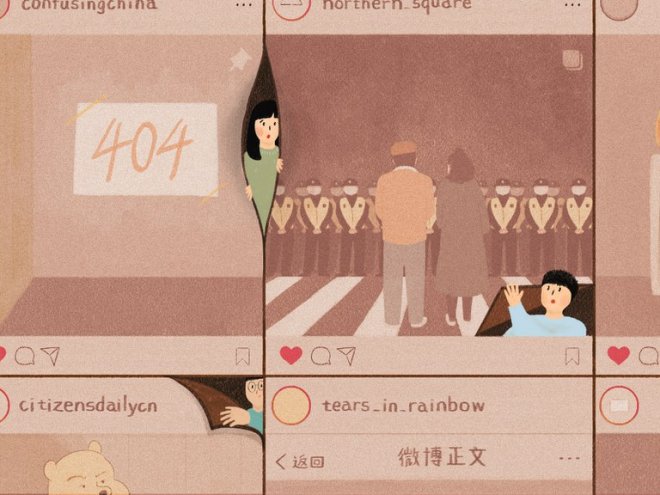 Prequel and progress of the White Paper Movement: China’s “anti-thieves” open Instagram overseas to preserve voices of dissent and identify each other in loneliness. Illustration by Huang Yuzhen
Prequel and progress of the White Paper Movement: China’s “anti-thieves” open Instagram overseas to preserve voices of dissent and identify each other in loneliness. Illustration by Huang Yuzhen"Many people have been powerless to resist the settling of scores in the wake of those events, so reducing the amount they discuss or pay attention to the white paper movement is an act of self-protection," Zhang says.
Nonetheless, Zhang believes that the movement has served a purpose: People now know that they can express their demands and resist an unreasonable government.
"This is just the beginning," he says.
Xia Hao: @CitizensDailyCN on Twitter and Instagram, @VoiceOfCN on Telegram
Millennial Xia Hao, who lives in Canada, says she started her account in response to the death of Li Wenliang, the whistleblowing Wuhan doctor who was punished for trying to warn people about the emerging pandemic despite a government cover-up, only to succumb to the virus himself.
The account was inspired by the subtle ways people found on Chinese social media to get around censorship to express their condolences over Li"s death, with oblique references to the self-criticism he was forced to write for his attempt to warn the world about COVID-19.
Her account came on the heels of other news discussion groups on Telegram, which themselves took inspiration from accounts used to share ideas, information and strategy during the 2019 protest movement in Hong Kong. She hopes the growing number of groups like hers push Chinese authorities to rethink their efforts to control online discourse.
"If I go back to China, I really hope that there won"t be any need to circumvent the Great Firewall any more, and that there"ll be a bit more freedom," Xia says. "I don"t want to have to be fearful and make myself small.
"If your country is truly a great power, then it should instill its citizens who live overseas with confidence," says Xia.
Xia started off by simply posting satirical photos, but that changed when Peng Lifa made his solo demonstration from a Beijing traffic overpass on the eve of the 20th party congress in October.
After Peng"s "Bridge Man" protest, Xia"s account became dedicated to all-out advocacy. She began to post photos of overseas Chinese hanging up replicas of the banner, which called on ruling Chinese Communist Party leader Xi Jinping to step down and call elections, in cities around the world.
"A lot of [anti-Beijing] accounts are on Telegram, while there are more overseas student accounts on Instagram," Xia says.
She started an Instagram account in a bid to influence more younger Chinese people, whether they are still in China or overseas. Users aged 18-24 make up more than 60% of Instagram"s 1.44 billion users worldwide.
"Ideally, content should be generated in China ... then amplified overseas," Xia says. "That worked before the crackdown on the protests, but it"s kind of hard to make any big moves right now.
"All we can do from overseas is to try to keep a record of the movement."
Xiao Lei: @tears_in_rainbow on Instagram
Xiao Lei, who runs the "Tears in Rainbow" account on Instagram, takes a similar approach.
"Despite stricter censorship in China in recent years, some people are still able to read content from voices that are different from the government"s preferred theme tune," she says.
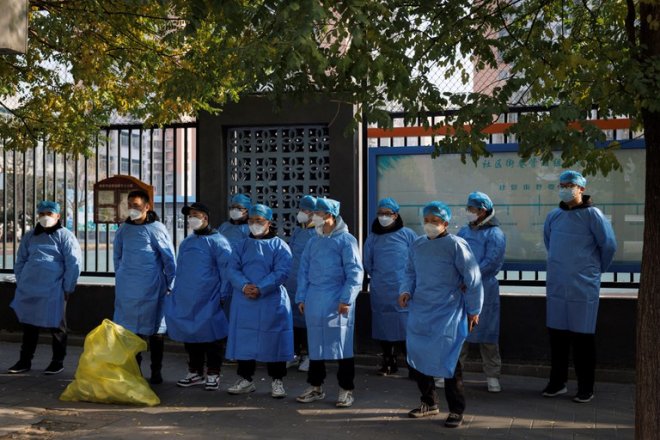 Epidemic prevention workers in protective aprons stand outside a locked-down residential compound as outbreaks of the coronavirus disease (COVID-19) continue in Beijing, November 23, 2022. REUTERS/Thomas Peter
Epidemic prevention workers in protective aprons stand outside a locked-down residential compound as outbreaks of the coronavirus disease (COVID-19) continue in Beijing, November 23, 2022. REUTERS/Thomas PeterShe found the effort to learn the truth to be moving, and planned to open the account to keep a private record of such things.
Then, the discovery of a woman chained in an outbuilding in the eastern province of Jiangsu in January 2022 took China"s internet by storm.
Amid growing public frustration with conflicting official statements on the woman"s origin and status, Xiao Lei decided to take her account public and post more often.
"I think overseas Chinese accounts have been more active lately, starting from the woman in chains, and all through the white paper movement," she says. "The anger has always been there, and has always been strong.
"I used to believe that young [Chinese] people were different from us, because they had been so brainwashed," she says. "Lately, I discovered that we"re all pretty similar.
"There will always be a small number of people who wake up, realize what"s happening, and decide they are going to cast off their shackles, no matter how much brainwashing goes on," Xiao Lei says.
Translated by Luisetta Mudie. Edited by Jim Snyder.
[圖擷取自網路,如有疑問請私訊]
|
本篇 |
不想錯過? 請追蹤FB專頁! |
| 喜歡這篇嗎?快分享吧! |
相關文章
AsianNewsCast









